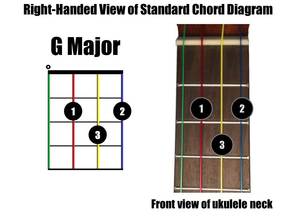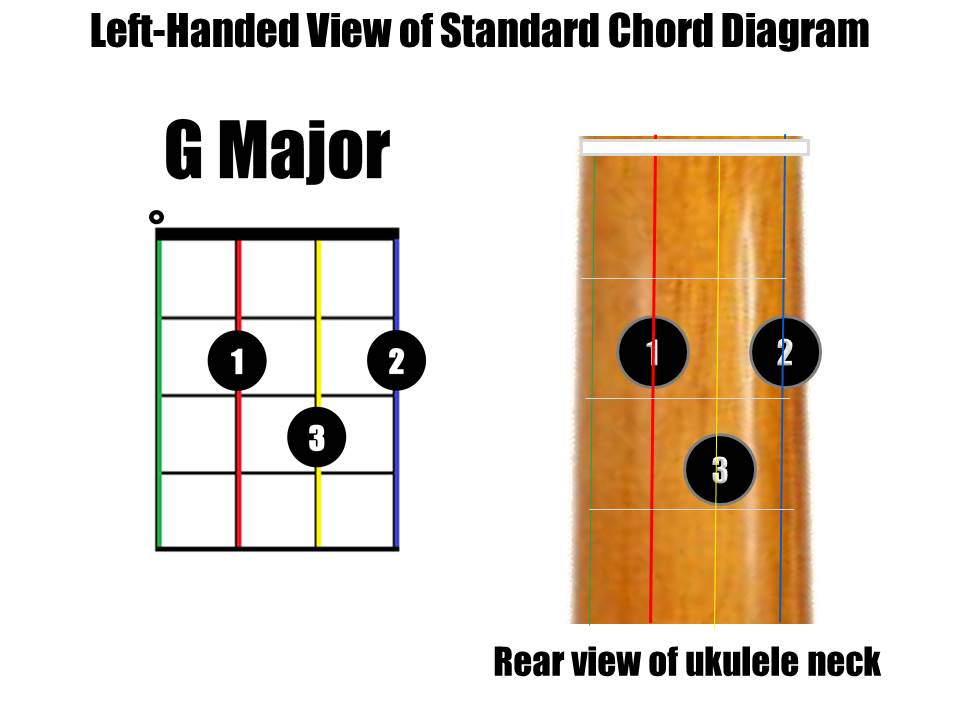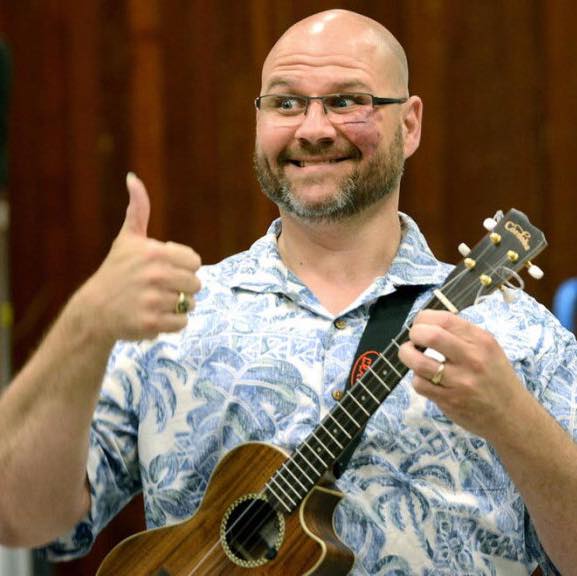So I'll state my (oddly) controversial opinion: We make accommodations for all sorts of students for all sorts of reasons. I arrange my seating order to give students the best chance of success, either for social reasons, or just so they can see the board. I have at least 4 desks in my room that are left-handed desks. I have installed colored strings on my ukuleles to help my students learn better.
Why the heck WOULDN'T I have a few left-handed instruments set aside for students who need them?!?
Look, when I started teaching guitar as a general music class, I was actually unaware that there WERE left-handed guitars. (I have no problem admitting that I was pretty green when I got into this...) I'm primarily a chorus teacher, and learned enough guitar in college to "boom-chuck" my way through elementary music, if necessary. Teaching class guitar in middle school kind of fell into my lap.
It wasn't until halfway through my first quarter teaching class guitar that I recall watching a student REALLY struggle to do the basics. Now, this wasn't an intellectually-challenged student, nor was he generally uncoordinated (he was a pretty good athlete, as I recall). Then I noticed that he was writing with his left hand, and it hit me...and I went to research whether there were such things as left-handed guitars. (There are.) I was lucky enough to have a sympathetic principal who immediately purchased 4 left-handed guitars, considering it a reasonable accommodation for students, and he immediately improved. Again, this wasn't a perception issue on either of our parts; neither he nor I knew that left-handed instruments were even a "thing."
I know the arguments. It's just that I consider most of them invalid. The arguments for teaching all "right-handed" tend to be the following:
1. Using your dominant hand for your fretting hand could be considered an advantage.
Honestly, I don't know if it would be or not. I've often wondered if I would feel differently if I had originally started by using my right hand (dominant) to fret, and the left hand to strum and pick. Truly, I think this is a hard thing to judge without having done it both ways. (Any enterprising University student want to start an extended study on the subject?!?) However, I will say this - as illustrated by the story above, I never knew about left-handed instruments until a left-handed student was having trouble playing right-handed. That's the answer for me, and my chosen focus. Not the "right" thing, but the right thing for the student. I will agree that, from my experience, some lefties will find an advantage in playing right-handed, and choose to do so. Others find it easier to go lefty - in 7 years, and about 800 students, I find that given the choice, it goes about 60/40 - 60% choose right-handed, 40% choose left.
And almost all of those 40% chose to continue in music after the class in some form.
2. Left-Handed students who learn using a left-handed instruments will be at a disadvantage when reading standard chord diagrams and TAB.
Well, that depends on how you teach. If you teach standard notation, it's not an issue at all, but I find it to be little issue even if you use it. (More on this later.) But let's look at chord diagrams. That was one of my main concerns at first, too. In fact, I created left-handed chord diagrams to go along with my "standard" ones, until one of my lefties pointed out something that I didn't realize, and probably should have: Standard chord diagrams actually make more sense to a lefty, if you think of them as looking through the neck from the back.
| Instead, this left-handed student said she found the left-handed chord charts to be confusing, because she saw the diagrams as interpreted from behind the fretboard, which actually makes a lot of sense; perhaps even more sense than the way we normally interpret it. As always, the limitations are in our perceptions, not necessarily in reality. Part of our job as teacher is to shape those perceptions. |
3. There are no right-handed or left-handed instruments; there's no left-handed or right-handed piano, after all!
I do hear this one a lot...and consider it one of the weakest arguments out there. There were also no left-handed desks...until there were. There were no left-handed scissors...until there were.
| This argument, at its root, truly is, "That's now how I've been taught," or "That's not how I've always done it," which is the same as saying, "I don't want to think in a different way than I have before for the benefit of my students." And, by the way, there IS a left-handed piano: | |
For ukulele, the answer is pretty much yes. (Guitar is a different matter...) The shorter scale of the ukulele means that there won't be a huge intonation problem until you're really up the neck, and on classroom instruments, I doubt you or the students will notice. THEY will notice that you've gone the extra mile to give them a chance to be successful, though! If they are purchasing higher-end instruments, then they might want to look for a specific lefty, but it shouldn't be that big of a deal.
Depending on the string gauge, there may need to be some slight alterations to the nut slots, but even though I'm capable of making minor adjustments to that, I've never needed to on any of my ukes, and I usually have up to 4 ukes set up for lefties.
I give the students the choice. This is the information I give them to make the decision on whether they want to learn lefty or righty:
- It is their choice. They can try back and forth for about a week, but I want them to settle one one fairly quickly to avoid confusion.
- If they CAN use a right-handed instrument, I recommend they do, because it will simplify many things down the road, including purchasing instruments, and being able to pick up a friend's instrument and play, etc. However, whichever is the one that "feels correct" to them, go for it.
The heart of the question should not be "what is the correct way," but instead "what is the right way for THIS student to be successful." I'm truly puzzled by teachers that force students to play ukulele or guitar right-handed. I see no purpose when the instruments are there and available. By all means, if there is something that I'm missing, please post it. I'm curious about where this attitude comes from!




 RSS Feed
RSS Feed
